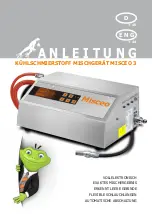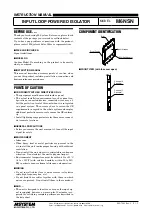
Index
DAQCard E Series User Manual
I -2
National Instruments Corporation
block diagrams
DAQCard-AI-16E-4, 3-1
DAQCard-AI-16XE-50, 3-2
bulletin board support, F-1
C
cables.
See also I/O connectors.
custom cabling, 1-5 to 1-6
field wiring considerations, 4-44
optional equipment, 1-5
part numbers for connectors, 1-6
calibration, 5-1 to 5-3
adjusting for gain error, 5-3
external calibration, 5-2 to 5-3
loading calibration constants, 5-1 to 5-2
mixing unipolar and bipolar channels
(note), 3-5
power-management modes (table), E-2
self-calibration, 5-2
Card and Socket Services, C-1
charge injection, 3-8
clocks, DAQCard, 3-14
commonly asked questions.
See questions and
answers
.
common-mode signal rejection, 4-20
configuration.
See also input configurations.
questions about, D-2
software configuration, 2-2 to 2-3
connectors.
See I/O connectors.
CONVERT* signal
signal routing, 3-13
multiplexer for controlling
(figure), 3-13
timing connections, 4-33 to 4-34
input timing (figure), 4-33
output timing (figure), 4-34
counter power-management modes
(table), E-2
current, saving, A-12, C-2
customer communication,
xiv
, F-1 to F-2
D
DAQCard clocks, 3-14
DAQCard E Series.
See also hardware
overview
.
custom cabling, 1-5 to 1-6
features, 1-1
getting started, 1-2
optional equipment, 1-5 to 1-6
questions about, D-1 to D-5
software programming choices
LabVIEW and LabWindows/CVI
application software, 1-2 to 1-3
NI-DAQ driver software, 1-3 to 1-4
register-level programming, 1-4
unpacking, 1-6
DAQ-STC system timing controller, 1-1, D-1
data acquisition timing connections,
4-24 to 4-36
AIGATE signal, 4-34 to 4-35
CONVERT* signal, 4-33 to 4-34
EXTSTROBE* signal, 4-27
SCANCLK signal, 4-26
SISOURCE signal, 4-35
STARTSCAN signal, 4-30 to 4-33
TRIG1 signal, 4-27 to 4-28
TRIG2 signal, 4-29 to 4-30
typical posttriggered acquisition
(figure), 4-25
typical pretriggered acquisition
(figure), 4-25
UISOURCE signal, 4-36
DGND signal
DAQCard-AI-16E-4 (table), 4-6
DAQCard-AI-16XE-50 (table), 4-8
description, 4-3
digital I/O connections, 4-21
timing I/O connections, 4-23
DIFF (differential) input mode
definition (table), 3-3
description, 4-14









































